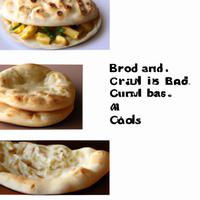
1 serving (60 grams) contains 160 calories, 5.0 grams of protein, 1.5 grams of fat, and 33.0 grams of carbohydrates.

Log this food in SnapCalorie

Nutrition Information
Calories |
640.0 | ||
|---|---|---|---|
% Daily Value* |
|||
| Total Fat | 6 g | 7% | |
| Saturated Fat | 1.2 g | 6% | |
| Polyunsaturated Fat | 0 g | ||
| Cholesterol | 0 mg | 0% | |
| Sodium | 1280.0 mg | 55% | |
| Total Carbohydrates | 132 g | 48% | |
| Dietary Fiber | 4.0 g | 14% | |
| Sugars | 4.0 g | ||
| protein | 20.0 g | 40% | |
| Vitamin D | 0 mcg | 0% | |
| Calcium | 80.0 mg | 6% | |
| Iron | 6 mg | 33% | |
| Potassium | 200.0 mg | 4% | |
* Percent Daily Values are based on a 2,000 calorie diet. Your daily values may be higher or lower depending on your calorie needs.
Food Attributes
Source of Calories
About Syrian bread
Syrian bread, also known as pita bread, is a soft, round, and versatile flatbread originating from Middle Eastern cuisine, particularly Syria. Traditionally made from simple ingredients like flour, water, yeast, and salt, it features a unique pocket that forms when baked at high temperatures. This bread is often used as a wrap, sandwich base, or accompaniment to dips like hummus and baba ghanoush. Nutritionally, Syrian bread is a good source of carbohydrates, providing energy, and contains small amounts of protein and fiber, especially if made with whole wheat flour. It is generally low in fat, making it a healthier bread option compared to richer or butter-laden varieties. However, the white flour version may have reduced fiber and fewer nutrients. Syrian bread’s simplicity and versatility make it a staple in Middle Eastern diets, offering a satisfying yet balanced addition to meals.



